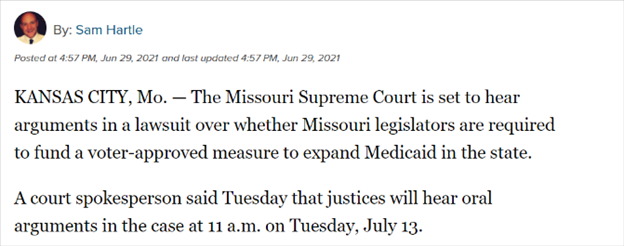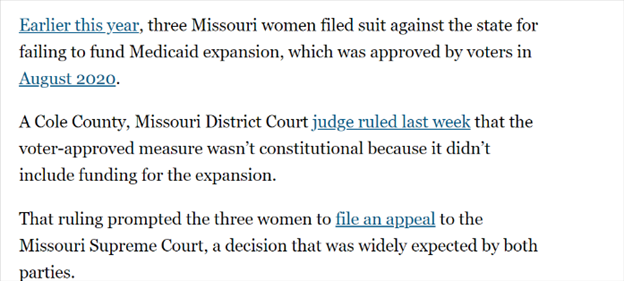MM Curator summary
SCOTUS failed to adjudicate the work requirements case this term.
The article below has been highlighted and summarized by our research team. It is provided here for member convenience as part of our Curator service.
The U.S. Supreme Court in Washington.
Photographer: Stefani Reynolds/Bloomberg
Chief Justice John Roberts closed the latest Supreme Court term earlier this month with the fight over work requirements for Medicaid beneficiaries unresolved.
Trump administration approvals of programs in Arkansas and New Hampshire requiring all Medicaid beneficiaries to work or participate in job-skills training to remain eligible for the health-care coverage sparked the dispute. The justices put the case on hold in April after the Biden administration announced the Centers for Medicare & Medicaid Services was withdrawing the prior administration’s approvals.
The case is now on life support and likely won’t be fully put to bed until early next term, some health law scholars say. The delay gives Arkansas time to pursue its administrative appeal of the Biden administration’s decision to withdraw the prior approval even though it’s unlikely the state will prevail.
“CMS has now sent out cancellation letters to most states, but states have the opportunity to appeal the withdrawal through an agency process and, in theory at least, the agency could change its mind,” said Nicholas Bagley, a law professor at the University of Michigan Law School.
“The Supreme Court is likely waiting for those processes to work their way through,” he said.
Political Game?
When the U.S. Court of Appeals for the District of Columbia Circuit affirmed the district court’s decision to void the work rules, Arkansas and New Hampshire joined the Trump administration in an appeal to the Supreme Court. The justices originally agreed to hear the case, but later canceled oral arguments and held the case in abeyance.
In a letter to the court on June 11, the Department of Justice said New Hampshire didn’t timely file a notice of appeal with the Department of Health and Human Services. Arkansas filed its appeal within the 30-day deadline, but Bagley wonders if it’s a waste of time since the state’s waiver expires at the end of the year anyway.
“They’re not going to get a new work requirements waiver so it’s not exactly clear to me what game they’re playing,” he said of Arkansas’s appeal. “Is it just motivated by politics? Is there any practical upshot to contesting the withdrawal of the waiver given that they’re not going to turn work requirements back on before the end of the year?”
In a statement to Bloomberg Law, a spokeswoman for Arkansas Attorney General Leslie Rutledge (R) said it’s the Biden administration “who is playing politics.”
“After the Biden Administration terminated Arkansas’s waiver, Rutledge appealed to the U.S. Department of Health and Human Services so she could continue to seek review of the D.C. Circuit’s decision,” the spokeswoman, Amanda Priest, said in an email.
“Far from only setting aside the Arkansas Works waiver, the D.C. Circuit’s decision has far-reaching implications for any number of healthy-behavior incentives for which Arkansas and its sister States might seek approval in Medicaid going forward,” she said.
The Justice Department told the court it also thinks the D.C. Circuit decisions went too far even though they invalidated the states’ work requirements. However, the DOJ and Arkansas disagree on what the court should do about it.
The DOJ has asked the justices to wipe the appeals court decisions off the books and send the issue back to the agency. The court of appeals decisions threaten to significantly curtail the scope of the HHS secretary’s authority to approve state programs that experiment with how the Medicaid program is run, the DOJ argued.
The appeals court said Medicaid’s primary objective is to provide low-income people access to medical care.
Social Determinants
The DOJ could be concerned the appeals court decisions will affect other experimental projects that allow states to use Medicaid funds on other social issues affecting a person’s health, like housing and food insecurity, which is a big priority for the Biden administration.
North Carolina, for example, wants to spend $650 million over a five-year period in Medicaid directly paying for services related to housing, nutrition, transportation, interpersonal violence, and toxic stress. The project was approved under the Trump administration but put on hold during the Covid-19 public health emergency. Its goal is to test whether these interventions can improve health outcomes and reduce costs for the Medicaid program.
Health policy experts don’t think the appeals court decisions on Medicaid work requirements will stand in the way of pilot projects like that.
“The core issue in this case was that making Medicaid coverage conditional, not just on work but really adding additional conditions onto Medicaid coverage using 1115 waiver authority, was not promoting the objective of medical assistance,” said Eliot Fishman, senior director of health policy at Families USA, a consumer health-advocacy organization.
“There is no conceivable Biden administration social determinants-oriented waiver approval that is going to be ‘We want to take coverage away from people for social determinants reasons.'”
Instead, Fishman thinks the DOJ was trying to entice some of the court’s more conservative members not to hear this case.
“Asking the Supreme Court to let the circuit decisions stand might have been too much for people on this court who might be sympathetic to work requirements,” he said. “This was a way to just sort of remove the whole controversy and avoid having the Supreme Court rule one way or another on the circuit court’s view.”
Fishman served as a member of the Biden-Harris transition team that reviewed the HHS.
But vacating the court of appeals’ rulings and remanding the matter to the HHS would leave in place the district court decisions tossing out the Trump administration’s approvals, Arkansas argued.
That could make any challenge to CMS’s withdrawal of the waivers futile and the district court’s judgments unreviewable, the state wrote in its opposition brief.
Instead, the Natural State wants the Supreme Court to hear the case and provide the parties, and lower courts, with critical guidance on what the objectives of Medicaid really are.
The consolidated case is Becerra v. Gresham, U.S., No. 20-37.
— With assistance from Christopher Brown
Clipped from: https://news.bloomberglaw.com/us-law-week/supreme-court-leaves-fight-over-medicaid-work-rules-in-limbo











